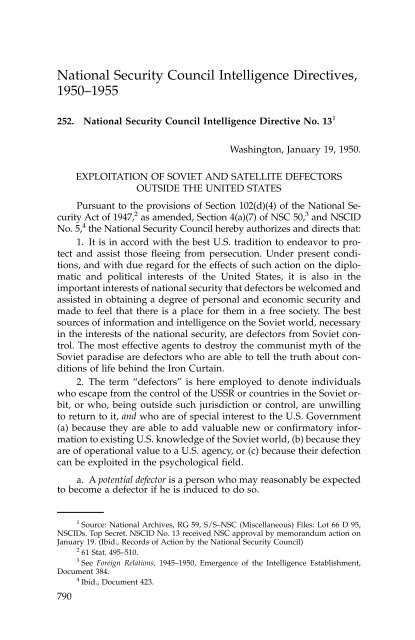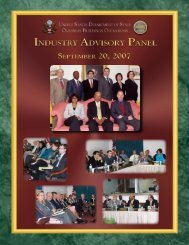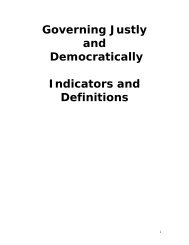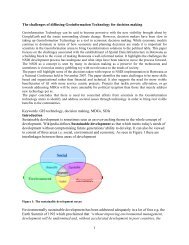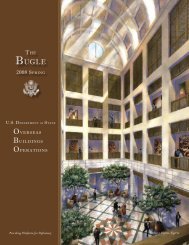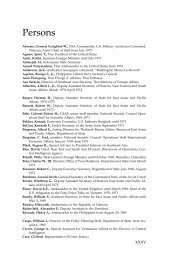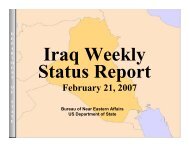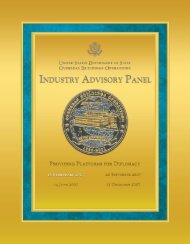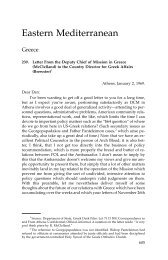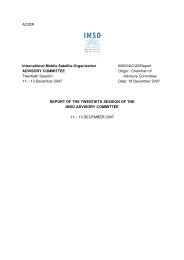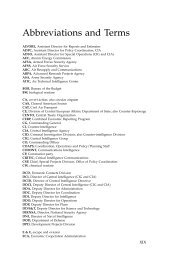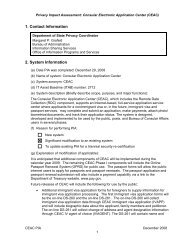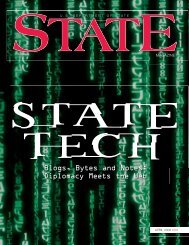NSCIDs - US Department of State
NSCIDs - US Department of State
NSCIDs - US Department of State
Create successful ePaper yourself
Turn your PDF publications into a flip-book with our unique Google optimized e-Paper software.
National Security Council Intelligence Directives,<br />
1950–1955<br />
252. National Security Council Intelligence Directive No. 13 1<br />
Washington, January 19, 1950.<br />
EXPLOITATION OF SOVIET AND SATELLITE DEFECTORS<br />
OUTSIDE THE UNITED STATES<br />
Pursuant to the provisions <strong>of</strong> Section 102(d)(4) <strong>of</strong> the National Security<br />
Act <strong>of</strong> 1947, 2 as amended, Section 4(a)(7) <strong>of</strong> NSC 50, 3 and NSCID<br />
No. 5, 4 the National Security Council hereby authorizes and directs that:<br />
1. It is in accord with the best U.S. tradition to endeavor to protect<br />
and assist those fleeing from persecution. Under present conditions,<br />
and with due regard for the effects <strong>of</strong> such action on the diplomatic<br />
and political interests <strong>of</strong> the United <strong>State</strong>s, it is also in the<br />
important interests <strong>of</strong> national security that defectors be welcomed and<br />
assisted in obtaining a degree <strong>of</strong> personal and economic security and<br />
made to feel that there is a place for them in a free society. The best<br />
sources <strong>of</strong> information and intelligence on the Soviet world, necessary<br />
in the interests <strong>of</strong> the national security, are defectors from Soviet control.<br />
The most effective agents to destroy the communist myth <strong>of</strong> the<br />
Soviet paradise are defectors who are able to tell the truth about conditions<br />
<strong>of</strong> life behind the Iron Curtain.<br />
2. The term “defectors” is here employed to denote individuals<br />
who escape from the control <strong>of</strong> the <strong>US</strong>SR or countries in the Soviet orbit,<br />
or who, being outside such jurisdiction or control, are unwilling<br />
to return to it, and who are <strong>of</strong> special interest to the U.S. Government<br />
(a) because they are able to add valuable new or confirmatory information<br />
to existing U.S. knowledge <strong>of</strong> the Soviet world, (b) because they<br />
are <strong>of</strong> operational value to a U.S. agency, or (c) because their defection<br />
can be exploited in the psychological field.<br />
a. A potential defector is a person who may reasonably be expected<br />
to become a defector if he is induced to do so.<br />
1<br />
Source: National Archives, RG 59, S/S–NSC (Miscellaneous) Files: Lot 66 D 95,<br />
<strong>NSCIDs</strong>. Top Secret. NSCID No. 13 received NSC approval by memorandum action on<br />
January 19. (Ibid., Records <strong>of</strong> Action by the National Security Council)<br />
2<br />
61 Stat. 495–510.<br />
3<br />
See Foreign Relations, 1945–1950, Emergence <strong>of</strong> the Intelligence Establishment,<br />
Document 384.<br />
4<br />
Ibid., Document 423.<br />
790
<strong>NSCIDs</strong> 791<br />
b. A declared defector is a person who has left the service <strong>of</strong> his<br />
country and therefore requires protection and assistance.<br />
c. Inducement means the commission <strong>of</strong> an act by, or manifestly at<br />
the instigation <strong>of</strong>, an American <strong>of</strong>ficial which is demonstrably intended<br />
to bring about a defection and for which the U.S. Government might,<br />
if the act were discovered, be called upon to account.<br />
Potential Defectors<br />
3. CIA shall be responsible for inducing the defection <strong>of</strong> potential<br />
defectors, except in the cases where it is manifestly in the interest <strong>of</strong><br />
security or efficiency that representatives <strong>of</strong> other agencies undertake<br />
such action.<br />
Declared Defectors<br />
4. The ranking American <strong>of</strong>ficial in the area concerned shall be responsible<br />
for determining the manner and degree to which the acceptance<br />
or rejection <strong>of</strong> a declared defector may affect the diplomatic<br />
and political interests <strong>of</strong> the United <strong>State</strong>s. Any overt publicity and<br />
propaganda exploitation <strong>of</strong> a defector shall be coordinated with the<br />
<strong>Department</strong> <strong>of</strong> <strong>State</strong>.<br />
5. The Central Intelligence Agency shall be responsible for the<br />
covert exploitation <strong>of</strong> defectors, and shall, within the framework <strong>of</strong><br />
paragraph 4, coordinate all matters concerned with the handling and<br />
disposition <strong>of</strong> declared defectors from the Soviet Union and the satellite<br />
states in order to assure the effective exploitation <strong>of</strong> all defectors<br />
for operational, intelligence, or psychological purposes by the U.S. Government.<br />
6. CIA shall seek the guidance <strong>of</strong> the appropriate <strong>Department</strong>s to<br />
insure that no action taken under this directive jeopardizes the military,<br />
security, political, or diplomatic interests <strong>of</strong> the United <strong>State</strong>s and<br />
shall keep the other IAC agencies adequately informed <strong>of</strong> actions taken<br />
with respect to individual defector cases.<br />
7. Subject to the over-all direction <strong>of</strong> the Chief <strong>of</strong> Mission, CIA<br />
representatives in the field shall have operating responsibility outside<br />
U.S. occupied areas for:<br />
a. Providing secure facilities and preliminary assessment <strong>of</strong> a defector’s<br />
bona fides and his intelligence or other potential value to the<br />
U.S. Government.<br />
b. Assuring that the other IAC agencies have adequate opportunity<br />
to exploit a defector for intelligence or operational purposes, including<br />
immediate access to the defector in the field.<br />
c. Arranging secure movement <strong>of</strong> defectors as required.<br />
8. In U.S. occupied areas CIA shall establish, together with the <strong>Department</strong><br />
<strong>of</strong> <strong>State</strong> and that military department having executive authority<br />
in the area, adequate procedures designed to carry out the obligations<br />
listed in paragraphs 7 a–c.
792 Foreign Relations, 1950–1955<br />
9. Field representatives <strong>of</strong> the IAC agencies shall be responsible for:<br />
a. Informing promptly the ranking American <strong>of</strong>ficial and the CIA<br />
representative <strong>of</strong> any potential or declared defector who comes to their<br />
attention.<br />
b. Directly or through questionnaires, representing the intelligence<br />
interests <strong>of</strong> their respective agencies in the debriefing <strong>of</strong> such<br />
defectors.<br />
10. To the extent that there are available funds, CIA shall be responsible<br />
for the final disposal and rehabilitation <strong>of</strong> defectors. The IAC<br />
agencies shall provide all possible assistance to CIA in establishing<br />
rapid and effective means <strong>of</strong> disposal.<br />
11. If it appears to be in the national interest to bring a defector<br />
to the United <strong>State</strong>s for intelligence purposes or operational use, CIA<br />
shall be responsible for coordinating with the interested departments<br />
and agencies for policy approval and for making necessary arrangements<br />
in advance for entry. CIA shall also be responsible for handling<br />
and disposal <strong>of</strong> the defector in agreement with the interested departments<br />
or agencies. In each case, notice and full available biographic<br />
and background information will be given to the Federal Bureau <strong>of</strong> Investigation<br />
in advance. No commitments for entry for intelligence purposes<br />
or operational use will be made by any United <strong>State</strong>s <strong>of</strong>ficial<br />
without coordination and notice as set forth in this paragraph.<br />
253. National Security Council Intelligence Directive No. 14 1<br />
Washington, March 3, 1950.<br />
EXPLOITATION OF DEFECTORS AND OTHER ALIENS WITHIN<br />
THE UNITED STATES<br />
Pursuant to the provisions <strong>of</strong> the National Security Act <strong>of</strong> 1947, 2<br />
as amended, and Section 4 <strong>of</strong> NSC 50, 3 the National Security Council,<br />
1<br />
Source: National Archives, RG 59, S/S–NSC (Miscellaneous) Files: Lot 66 D 95,<br />
<strong>NSCIDs</strong>. Top Secret. NSCID No. 14 received NSC approval by memorandum action on<br />
March 3. (Ibid., Records <strong>of</strong> Action by the National Security Council)<br />
2<br />
61 Stat. 495–510.<br />
3<br />
See Foreign Relations, 1945–1950, Emergence <strong>of</strong> the Intelligence Establishment,<br />
Document 384.
<strong>NSCIDs</strong> 793<br />
with the concurrence <strong>of</strong> the Attorney General <strong>of</strong> the United <strong>State</strong>s,<br />
hereby authorizes and directs that:<br />
1. Exploitation <strong>of</strong> aliens within the U.S. for internal security purposes<br />
shall be the responsibility <strong>of</strong> the Federal Bureau <strong>of</strong> Investigation.<br />
Exploitation <strong>of</strong> aliens as sources <strong>of</strong> foreign intelligence information or<br />
for other foreign intelligence purposes shall be the responsibility <strong>of</strong> the<br />
Central Intelligence Agency. This allocation to the Federal Bureau <strong>of</strong><br />
Investigation and to the Central Intelligence Agency <strong>of</strong> separate areas<br />
<strong>of</strong> alien exploitation responsibility does not preclude joint exploitation,<br />
which must be encouraged whenever feasible. It further carries with it<br />
the obligation for each agency to give to the other, without delay and<br />
directly, all information pertinent to the activities and responsibilities<br />
<strong>of</strong> that other agency, such as the FBI notifying CIA promptly <strong>of</strong> aliens<br />
<strong>of</strong> potential foreign intelligence interest who may come to its attention<br />
and CIA notifying FBI <strong>of</strong> information it obtains relating to internal security<br />
problems.<br />
2. Exploitation <strong>of</strong> aliens by the Central Intelligence Agency or by<br />
the other member agencies <strong>of</strong> the Intelligence Advisory Committee<br />
shall be conducted for the following purposes:<br />
a. To obtain foreign intelligence information required in the interests<br />
<strong>of</strong> national security or by the member agencies <strong>of</strong> the Intelligence<br />
Advisory Committee.<br />
b. To obtain internal security information or other data required<br />
by the Federal Bureau <strong>of</strong> Investigation in the discharge <strong>of</strong> its domestic<br />
responsibilities.<br />
c. For such other purposes as the National Security Council shall<br />
deem to be in the interests <strong>of</strong> national security.<br />
3. In the case <strong>of</strong> any <strong>of</strong>ficial, employee, or other individual <strong>of</strong>ficially<br />
attached to a foreign government or one <strong>of</strong> its agencies, an <strong>of</strong>ficial<br />
<strong>of</strong> a political party <strong>of</strong>ficially recognized by its government, or an<br />
<strong>of</strong>ficial <strong>of</strong> an international organization, in an overt or covert capacity,<br />
who defects within the United <strong>State</strong>s, the Federal Bureau <strong>of</strong> Investigation<br />
shall:<br />
a. Immediately notify CIA, as well as the other IAC members and<br />
other interested agencies, <strong>of</strong> the actual or potential defection.<br />
b. Determine ins<strong>of</strong>ar as is possible the legitimacy <strong>of</strong> such reported<br />
potential or actual defection within the United <strong>State</strong>s, and whether the<br />
individual’s determination to defect or his defection is or is not known<br />
to his government.<br />
c. Immediately notify the Attorney General and the <strong>Department</strong><br />
<strong>of</strong> <strong>State</strong> <strong>of</strong> the identity <strong>of</strong> the individual concerned and his <strong>of</strong>ficial connection<br />
with a foreign government, as well as his status as a defector.<br />
Comments and observations will be solicited from the Attorney General<br />
and the <strong>State</strong> <strong>Department</strong>.
794 Foreign Relations, 1950–1955<br />
d. Be initially responsible for exploitation <strong>of</strong> all such actual or potential<br />
defectors, and maintain sole jurisdiction over them until completion<br />
<strong>of</strong> its internal security exploitation, unless it is jointly determined<br />
that the foreign intelligence interest shall be paramount in the<br />
particular case.<br />
e. Determine whether such potential defector can be utilized in a<br />
clandestine capacity and when so utilized provide through CIA, or the<br />
other interested agency, for satisfaction <strong>of</strong> foreign intelligence requirements.<br />
Appropriate security restrictions will be agreed upon in individual<br />
cases. If, for operational reasons, it is not possible for the FBI to<br />
immediately fulfill foreign intelligence requirements <strong>of</strong> the other<br />
agency, such notice will be provided to CIA and the other agency.<br />
f. Make immediately available to CIA with copies to interested<br />
IAC members all foreign intelligence information resulting from the<br />
initial exploitation <strong>of</strong> such a defector, and provide, through established<br />
channels, for his interview by other member agencies <strong>of</strong> the IAC upon<br />
their request, prior to the full exhaustion <strong>of</strong> internal security requirements<br />
if feasible.<br />
g. On request by CIA, arrange for the transfer <strong>of</strong> such a defector<br />
to the jurisdiction <strong>of</strong> the CIA upon completion <strong>of</strong> its internal security<br />
exploitation, unless it is jointly determined that the foreign intelligence<br />
interest is paramount prior to that time. The CIA will assume responsibility<br />
for necessary maintenance and custody during the period <strong>of</strong> its<br />
exploitation and shall be responsible for the final disposal and rehabilitation<br />
<strong>of</strong> all such defectors. Internal security problems will remain<br />
the responsibility <strong>of</strong> the Federal Bureau <strong>of</strong> Investigation. The final<br />
disposition <strong>of</strong> the alien and reimbursement <strong>of</strong> maintenance expenses<br />
will be determined by mutual agreement in advance among the CIA<br />
and interested agencies in each case, based upon future operational<br />
considerations.<br />
h. Pursuant to the provisions <strong>of</strong> Section 102(e) <strong>of</strong> the National Security<br />
Act <strong>of</strong> 1947, as amended, upon the written request <strong>of</strong> the Director<br />
<strong>of</strong> Central Intelligence, provide all available information and pertinent<br />
observations with respect to the internal security factors involved<br />
in the exploitation <strong>of</strong> each defector for foreign intelligence information.<br />
4. In the case <strong>of</strong> aliens within the U.S., other than those covered<br />
in paragraph 3 above, CIA shall:<br />
a. Be responsible for their exploitation for foreign intelligence under<br />
the provisions <strong>of</strong> NSCID No. 7. 4<br />
4 Ibid., Document 427.
<strong>NSCIDs</strong> 795<br />
b. In order that the statutory responsibilities and domestic intelligence<br />
jurisdiction <strong>of</strong> the Federal Bureau <strong>of</strong> Investigation may be adequately<br />
handled and in order to prevent confusion in internal security<br />
matters, the CIA or any other authorized intelligence agency will,<br />
prior to exploiting an alien within the United <strong>State</strong>s, advise the FBI in<br />
advance <strong>of</strong> the exploitation. The FBI will then provide information it<br />
has which may be <strong>of</strong> assistance in the exploitation by the other agency<br />
and will make such observations as are pertinent, including notice that<br />
exploitation by the other agency would interfere with matters involved<br />
in internal security or execution <strong>of</strong> the statutory obligations <strong>of</strong> the FBI.<br />
c. After determining priorities, arrange for exploitation <strong>of</strong> the alien<br />
for foreign intelligence purposes by any other IAC agency or agencies<br />
which may request independent exploitation <strong>of</strong> the alien. The CIA will<br />
assume responsibility for necessary maintenance and custody during<br />
the period <strong>of</strong> exploitation. During the period <strong>of</strong> such maintenance, internal<br />
security problems will remain the responsibility <strong>of</strong> the Federal<br />
Bureau <strong>of</strong> Investigation, except as is provided below. Reimbursement<br />
<strong>of</strong> maintenance expenses will be determined by mutual agreement in<br />
advance among the CIA and interested agencies in each case.<br />
d. Notify the FBI immediately <strong>of</strong> information obtained through its<br />
own facilities or from other IAC agencies that an alien within the U.S.<br />
has defected or may defect. To accomplish this end, the other IAC agencies<br />
will transmit without delay all such pertinent information to the<br />
CIA and the FBI.<br />
5. If it appears to be in the national interest to bring a defector to<br />
the United <strong>State</strong>s for intelligence purposes or operational use under<br />
the provisions <strong>of</strong> this Directive, CIA shall be responsible for coordinating<br />
with the other interested departments and agencies for policy<br />
approval and for making necessary arrangements in advance for entry.<br />
CIA shall also be responsible for handling and disposal <strong>of</strong> the defector<br />
in agreement with the interested departments or agencies, and<br />
until such disposal will make adequate provisions to insure that the<br />
defector does not endanger the internal security <strong>of</strong> the United <strong>State</strong>s.<br />
In each case, notice and full available biographic and background information<br />
will be given to the Federal Bureau <strong>of</strong> Investigation in advance.<br />
No commitments for entry for intelligence purposes or operational<br />
use will be made by any United <strong>State</strong>s <strong>of</strong>ficial without<br />
coordination and notice as set forth in this paragraph.<br />
6. Any overt publicity and propaganda exploitation <strong>of</strong> a defector<br />
shall be coordinated with the <strong>Department</strong> <strong>of</strong> <strong>State</strong>.
796 Foreign Relations, 1950–1955<br />
254. National Security Council Intelligence Directive No. 15 1<br />
Washington, June 13, 1951.<br />
COORDINATION AND PRODUCTION OF FOREIGN<br />
ECONOMIC INTELLIGENCE<br />
Pursuant to the provisions <strong>of</strong> Section 102 (d) <strong>of</strong> the National Security<br />
Act <strong>of</strong> 1947, 2 as amended, the National Security Council hereby<br />
authorizes and directs the Central Intelligence Agency to perform the<br />
following functions with respect to foreign economic intelligence relating<br />
to the national security:<br />
1. Maintain a continuing review <strong>of</strong> the requirements <strong>of</strong> the United<br />
<strong>State</strong>s Government for foreign economic intelligence relating to the national<br />
security, and <strong>of</strong> the facilities and arrangements available to meet<br />
those requirements, making from time to time such recommendations<br />
to the National Security Council concerning improvements as may require<br />
National Security Council action.<br />
2. Insure through regular procedures that the full economic<br />
knowledge and technical talent available in the Government is brought<br />
to bear on important issues involving national security, including issues<br />
on which assistance is requested by the National Security Council<br />
or members there<strong>of</strong>.<br />
3. Evaluate, through regular procedures, the pertinence, extent,<br />
and quality <strong>of</strong> the foreign economic data available bearing on national<br />
security issues, and develop ways in which quality could be improved<br />
and gaps could be filled.<br />
4. Conduct, as a service <strong>of</strong> common concern, such foreign economic<br />
research and produce such foreign economic intelligence as may<br />
be required (a) to supplement that produced by other agencies either<br />
in the appropriate discharge <strong>of</strong> their regular departmental missions or<br />
in fulfillment <strong>of</strong> assigned intelligence responsibilities; (b) to fulfill requests<br />
<strong>of</strong> the Intelligence Advisory Committee.<br />
1 Source: Truman Library, President’s Secretary Files, Subject File. Confidential.<br />
NSCID No. 15 was approved by the NSC at its 94th meeting on June 13 (NSC Action<br />
No. 495). (National Archives, RG 59, S/S–NSC (Miscellaneous) Files: Lot 66 D 95, Records<br />
<strong>of</strong> Action by the National Security Council) A correction to NSCID No. 15 was issued<br />
on June 22. The text was unchanged, the only change being a minor adjustment to<br />
format.<br />
2 61 Stat. 495–510.
<strong>NSCIDs</strong> 797<br />
255. National Security Council Intelligence Directive No. 5 Revised 1<br />
Washington, August 28, 1951.<br />
ESPIONAGE AND COUNTERESPIONAGE OPERATIONS<br />
Pursuant to the provisions <strong>of</strong> Section 102 (d) <strong>of</strong> the National Security<br />
Act <strong>of</strong> 1947, 2 the National Security Council hereby authorizes<br />
and directs that:<br />
1. The Director <strong>of</strong> Central Intelligence shall conduct all organized<br />
Federal espionage operations outside the United <strong>State</strong>s and its possessions<br />
for the collection <strong>of</strong> foreign intelligence information required<br />
to meet the needs <strong>of</strong> all <strong>Department</strong>s and Agencies concerned, in connection<br />
with the national security, except for certain agreed activities<br />
by other <strong>Department</strong>s and Agencies.<br />
2. The Director <strong>of</strong> Central Intelligence shall conduct all organized<br />
Federal counterespionage operations outside the United <strong>State</strong>s and its<br />
possessions and in occupied areas, provided that this authority shall<br />
not be construed to preclude the counter-intelligence activities <strong>of</strong> any<br />
army, navy or air command or installation and certain agreed activities<br />
by <strong>Department</strong>s and Agencies necessary for the security <strong>of</strong> such<br />
organizations.<br />
3. The Director <strong>of</strong> Central Intelligence shall be responsible for coordinating<br />
covert and overt intelligence collection activities.<br />
4. When casual agents are employed or otherwise utilized by an<br />
IAC <strong>Department</strong> or Agency in other than an overt capacity, the Director<br />
<strong>of</strong> Central Intelligence shall coordinate their activities with the organized<br />
covert activities.<br />
5. The Director <strong>of</strong> Central Intelligence shall disseminate such intelligence<br />
information to the various <strong>Department</strong>s and Agencies which<br />
have an authorized interest therein.<br />
6. All other National Security Council Intelligence Directives or<br />
implementing supplements shall be construed to apply solely to overt<br />
intelligence activities unless otherwise specified.<br />
1 Source: National Archives, RG 273, <strong>NSCIDs</strong>. Top Secret. This revision <strong>of</strong> NSCID<br />
No. 5, December 12, 1947 (see Foreign Relations, 1945–1950, Emergence <strong>of</strong> the Intelligence<br />
Establishment, Document 423) added paragraphs 7–10. These paragraphs were proposed<br />
by the <strong>Department</strong> <strong>of</strong> Defense and circulated to the NSC under cover <strong>of</strong> July 30 and August<br />
8 memoranda from NSC Executive Secretary Lay. (Truman Library, President’s Secretary’s<br />
Files, Subject File) The revised NSCID No. 5 was approved by the NSC by memorandum<br />
action on August 28 (NSC Action No. 534). It was circulated to Council<br />
members by Lay by a memorandum <strong>of</strong> the same date. (Ibid.)<br />
2 61 Stat. 495–510.
798 Foreign Relations, 1950–1955<br />
7. In an occupied area, the representative <strong>of</strong> the Director <strong>of</strong> Central<br />
Intelligence will coordinate espionage and counterespionage operations<br />
in or from the area with the senior U.S. Representative and<br />
keep the Senior U.S. Military Commander informed in general <strong>of</strong> the<br />
clandestine collection activities conducted by DCI in or from such area.<br />
8. In an area other than theaters <strong>of</strong> war or occupied areas, the representative<br />
<strong>of</strong> the Director <strong>of</strong> Central Intelligence will keep the senior<br />
U.S. Representative appropriately advised <strong>of</strong> the espionage and counterespionage<br />
operations in or from the area.<br />
9. When CIA requires Service support for espionage and counterespionage<br />
projects, such support as may be authorized by the <strong>Department</strong><br />
<strong>of</strong> Defense will be planned jointly with the Joint Chiefs <strong>of</strong><br />
Staff.<br />
10. In time <strong>of</strong> war or when the President directs, the Director <strong>of</strong><br />
Central Intelligence will coordinate espionage and counterespionage<br />
operations in or from a theater <strong>of</strong> active military operations with the<br />
Joint Chiefs <strong>of</strong> Staff. In active theaters <strong>of</strong> war, where American forces<br />
are engaged, representatives <strong>of</strong> the Director <strong>of</strong> Central Intelligence conducting<br />
espionage and counterespionage operations in or from the theater<br />
shall be under the direct command <strong>of</strong> the United <strong>State</strong>s theater<br />
commander.<br />
256. National Security Council Intelligence Directive No. 1 Revised 1<br />
Washington, March 28, 1952.<br />
DUTIES AND RESPONSIBILITIES<br />
Pursuant to the provisions <strong>of</strong> Section 102 <strong>of</strong> the National Security<br />
Act <strong>of</strong> 1947, 2 and for the purposes enunciated in paragraphs (d) and<br />
1 Source: National Archives, RG 273, <strong>NSCIDs</strong>. Secret; Security Information. This revised<br />
version <strong>of</strong> NSCID No. 1 was approved by the National Security Council by memorandum<br />
action on March 28 (NSC Action No. 623). (National Archives, RG 59, S/S–NSC<br />
Files: Lot 66 D 95, Records <strong>of</strong> Action by the National Security Council). NSCID No. 1 as<br />
originally adopted by the NSC on December 12, 1947, is printed in CIA Cold War Records,<br />
The CIA Under Harry Truman, pp. 169–171. For the revision <strong>of</strong> July 7, 1949, see Foreign<br />
Relations, 1945–1950, Emergency <strong>of</strong> the Intelligence Establishment, Document 385 and<br />
Document 431, footnote 2. For the revision <strong>of</strong> January 19, 1950, see ibid., Document 432.<br />
2 61 Stat. 495–510.
<strong>NSCIDs</strong> 799<br />
(e) there<strong>of</strong>, the National Security Council hereby authorizes and directs<br />
that:<br />
1. To maintain the relationship essential to coordination between<br />
the Central Intelligence Agency and the intelligence organizations, an<br />
Intelligence Advisory Committee consisting <strong>of</strong> the Director <strong>of</strong> Central<br />
Intelligence, who shall be chairman there<strong>of</strong>, the Director, Federal Bureau<br />
<strong>of</strong> Investigation, and the respective intelligence chiefs from the <strong>Department</strong>s<br />
<strong>of</strong> <strong>State</strong>, Army, Navy, and Air Force, and from the Joint Staff<br />
(JCS), and the Atomic Energy Commission, or their representatives, shall<br />
be established to advise the Director <strong>of</strong> Central Intelligence. The Director<br />
<strong>of</strong> Central Intelligence will invite the chief, or his representative, <strong>of</strong><br />
any other intelligence Agency having functions related to the national<br />
security to sit with the Intelligence Advisory Committee whenever matters<br />
within the purview <strong>of</strong> his Agency are to be discussed.<br />
2. To the extent authorized by Section 102 (e) <strong>of</strong> the National Security<br />
Act <strong>of</strong> 1947, the Director <strong>of</strong> Central Intelligence, or representatives<br />
designated by him, by arrangement with the head <strong>of</strong> the department<br />
or agency concerned, shall make such surveys and inspections <strong>of</strong><br />
departmental intelligence material <strong>of</strong> the various Federal <strong>Department</strong>s<br />
and Agencies relating to the national security as he may deem necessary<br />
in connection with his duty to advise the NSC and to make recommendations<br />
for the coordination <strong>of</strong> intelligence activities.<br />
3. Coordination <strong>of</strong> intelligence activities should be designed primarily<br />
to strengthen the over-all governmental intelligence structure.<br />
Primary departmental requirements shall be recognized and shall receive<br />
the cooperation and support <strong>of</strong> the Central Intelligence Agency.<br />
a. The Director <strong>of</strong> Central Intelligence shall, in making recommendations<br />
or giving advice to the National Security Council pertaining<br />
to the intelligence activities <strong>of</strong> the various <strong>Department</strong>s and Agencies,<br />
transmit therewith a statement indicating the concurrence or<br />
non-concurrence <strong>of</strong> the members <strong>of</strong> the Intelligence Advisory Committee;<br />
provided that, when unanimity is not obtained among the <strong>Department</strong><br />
heads <strong>of</strong> the National Military Establishment, the Director <strong>of</strong><br />
Central Intelligence shall refer the problem to the Secretary <strong>of</strong> Defense<br />
before presenting it to the National Security Council.<br />
b. Recommendations <strong>of</strong> the Director <strong>of</strong> Central Intelligence shall,<br />
when approved by the National Security Council, issue as Council<br />
Directives to the Director <strong>of</strong> Central Intelligence. The respective intelligence<br />
chiefs shall be responsible for insuring that such orders or<br />
directives, when applicable, are implemented within their intelligence<br />
organizations.<br />
c. The Director <strong>of</strong> Central Intelligence shall act for the National Security<br />
Council to insure full and proper implementation <strong>of</strong> Council<br />
directives by issuing such supplementary DCI directives as may be
800 Foreign Relations, 1950–1955<br />
required. Such implementing directives in which the Intelligence Advisory<br />
Committee concurs unanimously shall be issued by the Director<br />
<strong>of</strong> Central Intelligence, and shall be implemented within the <strong>Department</strong>s<br />
and Agencies as provided in paragraph b. Where disagreement<br />
arises between the Director <strong>of</strong> Central Intelligence and one or more<br />
members <strong>of</strong> the Intelligence Advisory Committee over such directives,<br />
the proposed directive, together with statements <strong>of</strong> non-concurrence,<br />
shall be forwarded to the NSC for decision as provided in paragraph a.<br />
4. The Director <strong>of</strong> Central Intelligence shall produce intelligence<br />
relating to the national security, hereafter referred to as national intelligence.<br />
In so far as practicable, he shall not duplicate the intelligence<br />
activities and research <strong>of</strong> the various <strong>Department</strong>s and Agencies but<br />
shall make use <strong>of</strong> existing intelligence facilities and shall utilize departmental<br />
intelligence for such production purposes. For definitions<br />
see NSCID No. 3. 3<br />
5. a. The Director <strong>of</strong> Central Intelligence shall disseminate National<br />
Intelligence to the President, to members <strong>of</strong> the National Security<br />
Council, to the Intelligence Chiefs <strong>of</strong> the IAC Agencies, and to such<br />
Governmental <strong>Department</strong>s and Agencies as the National Security<br />
Council from time to time may designate. Intelligence so disseminated<br />
shall be <strong>of</strong>ficially concurred in by the Intelligence Agencies or shall<br />
carry a statement <strong>of</strong> substantially differing opinions.<br />
b. Unless otherwise provided by law or NSC Directive, the Director<br />
<strong>of</strong> Central Intelligence is authorized to disseminate National Intelligence<br />
on a strictly controlled basis to foreign governments and international<br />
bodies upon determination by the Director <strong>of</strong> Central<br />
Intelligence, concurred in by the Intelligence Advisory Committee, that<br />
such action would substantially promote the security <strong>of</strong> the United<br />
<strong>State</strong>s; provided that any disclosure <strong>of</strong> classified military information<br />
included in such national intelligence is in accordance with the policies<br />
laid down in the U.S. National Disclosure Policy (MIC 206/29), 4<br />
such determination to be made by the Army, Navy, and Air Force; and<br />
provided further that any disclosure <strong>of</strong> FBI intelligence information<br />
will be cleared with that Agency prior to dissemination.<br />
6. Whenever any member <strong>of</strong> the Intelligence Advisory Committee<br />
obtains information that indicates an impending crisis situation,<br />
such as the outbreak <strong>of</strong> hostilities involving the United <strong>State</strong>s, or a condition<br />
which affects the security <strong>of</strong> the United <strong>State</strong>s to such an extent<br />
that immediate action or decision on the part <strong>of</strong> the President or the<br />
3<br />
See Foreign Relations, 1945–1950, Emergence <strong>of</strong> the Intelligence Establishment,<br />
Document 426.<br />
4<br />
For a partial text <strong>of</strong> the National Disclosure Policy, see ibid., 1948, vol. I, Part 2,<br />
p. 575.
<strong>NSCIDs</strong> 801<br />
National Security Council seems to be required, he shall immediately<br />
furnish the information to the other members <strong>of</strong> the Intelligence Advisory<br />
Committee as well as to other <strong>of</strong>ficials or agencies as may be indicated<br />
by the circumstances. The Director <strong>of</strong> Central Intelligence shall<br />
immediately convene the Intelligence Advisory Committee. After receiving<br />
the views <strong>of</strong> the Intelligence Advisory Committee members,<br />
the Director <strong>of</strong> Central Intelligence shall promptly prepare and disseminate<br />
the national intelligence estimate in accordance with paragraphs<br />
4 and 5 above.<br />
7. When Security Regulations <strong>of</strong> the originating Agency permit,<br />
the Director <strong>of</strong> Central Intelligence shall disseminate to the Federal Bureau<br />
<strong>of</strong> Investigation and other <strong>Department</strong>s or Agencies intelligence<br />
or intelligence information which he may possess when he deems such<br />
dissemination appropriate to their functions relating to the national<br />
security.<br />
8. The Director <strong>of</strong> Central Intelligence shall perform for the benefit<br />
<strong>of</strong> the existing intelligence Agencies such services <strong>of</strong> common concern<br />
to these Agencies as the National Security Council determines can<br />
be more efficiently accomplished centrally.<br />
9. The intelligence organizations in each <strong>of</strong> the <strong>Department</strong>s and<br />
Agencies shall maintain with the Central Intelligence Agency and with<br />
each other, as appropriate to their respective responsibilities, a continuing<br />
interchange <strong>of</strong> intelligence information and intelligence available<br />
to them.<br />
10. The intelligence files in each intelligence organization, including<br />
the CIA, shall be made available under security regulations <strong>of</strong> the<br />
<strong>Department</strong> or Agency concerned to the others for consultation.<br />
11. The intelligence organizations within the limits <strong>of</strong> their capabilities<br />
shall provide, or procure, such intelligence as may be requested<br />
by the Director <strong>of</strong> Central Intelligence or by one <strong>of</strong> the other <strong>Department</strong>s<br />
or Agencies.<br />
12. The Director <strong>of</strong> Central Intelligence shall make arrangements<br />
with the respective <strong>Department</strong>s and Agencies to assign to the Central<br />
Intelligence Agency such experienced and qualified <strong>of</strong>ficers and members<br />
as may be <strong>of</strong> advantage for advisory, operational, or other purposes,<br />
in addition to such personnel as the Director <strong>of</strong> Central Intelligence may<br />
directly employ. In each case, such departmental personnel will be subject<br />
to the necessary personnel procedures <strong>of</strong> each <strong>Department</strong>.
802 Foreign Relations, 1950–1955<br />
257. National Security Council Intelligence Directive No. 9 Revised 1<br />
Washington, December 29, 1952.<br />
COMMUNICATIONS INTELLIGENCE<br />
Pursuant to the provisions <strong>of</strong> Section 101 and Section 102 <strong>of</strong> the<br />
National Security Act <strong>of</strong> 1947, 2 as amended, and to the Presidential directive<br />
approved October 24, 1952, 3 which<br />
a. <strong>State</strong>d that the communications intelligence (COMINT) activities<br />
<strong>of</strong> the United <strong>State</strong>s are a national responsibility, and that they must<br />
be so organized and managed as to exploit to the maximum the available<br />
resources in all participating departments and agencies and to satisfy<br />
the legitimate intelligence requirements <strong>of</strong> all such departments<br />
and agencies;<br />
b. Designated the Secretaries <strong>of</strong> <strong>State</strong> and Defense as a Special<br />
Committee <strong>of</strong> the National Security Council for COMINT, which Committee<br />
shall, with the assistance <strong>of</strong> the Director <strong>of</strong> Central Intelligence,<br />
establish policies governing COMINT activities, and keep the President<br />
advised <strong>of</strong> such policies through the Executive Secretary <strong>of</strong> the<br />
National Security Council (The President in approving this directive<br />
also directed that the Attorney General shall be a member <strong>of</strong> the<br />
1 Source: Truman Library, President’s Secretary’s Files, Subject File. Top Secret. The<br />
March 10, 1950, version <strong>of</strong> NSCID No. 9, is Foreign Relations, 1945–1950, Emergence <strong>of</strong><br />
the Intelligence Establishment, Document 435. For the original July 1, 1948, version, see<br />
ibid, Source note. This version was originally issued on October 24, 1952. (Truman Library,<br />
President’s Secretary’s Files, Subject File) After its issuance, on October 31 the Director<br />
<strong>of</strong> the Federal Bureau <strong>of</strong> Investigation J. Edgar Hoover wrote to Executive Secretary<br />
<strong>of</strong> the National Security Council Lay with three “observations.” First, Hoover wrote,<br />
the Attorney General should be a member <strong>of</strong> the Special Committee whenever matters<br />
<strong>of</strong> interest to the FBI were before the Committee. Second, the right <strong>of</strong> the <strong>US</strong>CIB “to investigate<br />
and study the standards and practices <strong>of</strong> its member agencies” was too broad.<br />
Third, the authority <strong>of</strong> the NSA Director to “have direct access” and “technical control”<br />
<strong>of</strong> “any elements” <strong>of</strong> the member agencies also was too broad (Ibid.) In his December<br />
17 reply, Lay informed Hoover the decision <strong>of</strong> the Special Committee to amend NSCID<br />
No. 9. There were three changes. First the sentence in parentheses at the end <strong>of</strong> preambular<br />
paragraph “b” was added. Second, in paragraph 1 d. (1) the Secretary <strong>of</strong> Defense<br />
and the Director <strong>of</strong> the Federal Bureau <strong>of</strong> Investigation were added to those who were<br />
given two votes. Finally, paragraph 4 was added. (Ibid.) Montague has an interesting account<br />
<strong>of</strong> the interagency sensitivities involved in this episode in General Walter Bedell<br />
Smith As Director <strong>of</strong> Central Intelligence, October 1950-February 1953, p. 253.<br />
2 61 Stat. 495–510.<br />
3 By memorandum <strong>of</strong> October 28, Executive Secretary <strong>of</strong> the National Security<br />
Council Lay informed the Secretaries <strong>of</strong> <strong>State</strong> and Defense that President Truman had<br />
approved this revised version <strong>of</strong> NSCID No. 9 on October 24. (Truman Library, President’s<br />
Secretary’s Files, Subject File)
<strong>NSCIDs</strong> 803<br />
Special Committee whenever matters <strong>of</strong> interest to the Federal Bureau<br />
<strong>of</strong> Investigation are before that Committee.); and<br />
c. Further designated the <strong>Department</strong> <strong>of</strong> Defense as executive<br />
agent <strong>of</strong> the Government, for the production <strong>of</strong> COMINT information;<br />
the Special Committee <strong>of</strong> the National Security Council for COMINT<br />
hereby authorizes and directs that:<br />
1. Directive to the United <strong>State</strong>s Communications Intelligence Board<br />
(<strong>US</strong>CIB).<br />
a. <strong>US</strong>CIB shall be reconstituted as a body acting for and under the<br />
Special Committee, and shall operate in accordance with the provisions<br />
<strong>of</strong> this directive. Only those departments or agencies represented in<br />
<strong>US</strong>CIB are authorized to engage in COMINT activities.<br />
b. The Board shall be composed <strong>of</strong> the following members:<br />
(1) The Director <strong>of</strong> Central Intelligence, who shall be Chairman <strong>of</strong><br />
the Board.<br />
(2) A representative <strong>of</strong> the Secretary <strong>of</strong> <strong>State</strong>.<br />
(3) A representative <strong>of</strong> the Secretary <strong>of</strong> Defense.<br />
(4) A representative <strong>of</strong> the Director <strong>of</strong> the Federal Bureau <strong>of</strong><br />
Investigation.<br />
(5) The Director <strong>of</strong> the National Security Agency (NSA).<br />
(6) A representative <strong>of</strong> the <strong>Department</strong> <strong>of</strong> the Army.<br />
(7) A representative <strong>of</strong> the <strong>Department</strong> <strong>of</strong> the Navy.<br />
(8) A representative <strong>of</strong> the <strong>Department</strong> <strong>of</strong> the Air Force.<br />
(9) A representative <strong>of</strong> the Central Intelligence Agency.<br />
c. The Board shall have a staff headed by an executive secretary<br />
who shall be appointed by the Chairman with the approval <strong>of</strong> the majority<br />
<strong>of</strong> the Board.<br />
d. It shall be the duty <strong>of</strong> the Board to advise and make recommendations<br />
to the Secretary <strong>of</strong> Defense, in accordance with the following procedure,<br />
with respect to any matter relating to communications intelligence<br />
which falls within the jurisdiction <strong>of</strong> the Director <strong>of</strong> NSA:<br />
(1) The Board shall reach its decision by a majority vote. Each<br />
member <strong>of</strong> the Board shall have one vote except the representatives <strong>of</strong><br />
the Secretary <strong>of</strong> <strong>State</strong>, the Secretary <strong>of</strong> Defense, the Director <strong>of</strong> the Federal<br />
Bureau <strong>of</strong> Investigation, and <strong>of</strong> the Central Intelligence Agency<br />
who shall each have two votes. The Director <strong>of</strong> Central Intelligence, as<br />
Chairman, will have no vote. In the event that the Board votes and<br />
reaches a decision, any dissenting member <strong>of</strong> the Board may appeal<br />
from such decision within 7 days to the Special Committee. In the event<br />
that the Board votes but fails to reach a decision, any member <strong>of</strong> the<br />
Board may appeal within 7 days to the Special Committee. In either<br />
event the Special Committee shall review the matter, and its determination<br />
thereon shall be final. Appeals by the Director <strong>of</strong> NSA and/or<br />
the representatives <strong>of</strong> the Military <strong>Department</strong>s shall only be filed with<br />
the approval <strong>of</strong> the Secretary <strong>of</strong> Defense.<br />
(2) If any matter is voted on by the Board but
804 Foreign Relations, 1950–1955<br />
(a) no decision is reached and any member files an appeal;<br />
(b) a decision is reached in which the representative <strong>of</strong> the<br />
Secretary <strong>of</strong> Defense does not concur and files an appeal;<br />
no action shall be taken with respect to the subject matter until the appeal<br />
is decided, provided that, if the Secretary <strong>of</strong> Defense determines, after<br />
consultation with the Secretary <strong>of</strong> <strong>State</strong>, that the subject matter presents<br />
a problem <strong>of</strong> an emergency nature and requires immediate action,<br />
his decision shall govern, pending the result <strong>of</strong> the appeal. In such an<br />
emergency situation the appeal may be taken directly to the President.<br />
(3) Recommendations <strong>of</strong> the Board adopted in accordance with<br />
the foregoing procedures shall be binding on the Secretary <strong>of</strong> Defense.<br />
Except on matters which have been voted on by the Board, the Director<br />
<strong>of</strong> NSA shall discharge his responsibilities in accordance with his<br />
own judgment, subject to the direction <strong>of</strong> the Secretary <strong>of</strong> Defense.<br />
(4) The Director <strong>of</strong> NSA shall make such reports and furnish such<br />
information from time to time to the Board, either orally or in writing,<br />
as the Board may request, and shall bring to the attention <strong>of</strong> the Board<br />
either in such reports or otherwise any new major policies or programs<br />
in advance <strong>of</strong> their adoption by him.<br />
e. It shall also be the duty <strong>of</strong> the Board as to matters not falling<br />
within the jurisdiction <strong>of</strong> NSA:<br />
(1) To coordinate the communications intelligence activities<br />
among all departments and agencies authorized by the President to<br />
participate therein;<br />
(2) To initiate, to formulate policies concerning, and subject to the<br />
provisions <strong>of</strong> NSCID No. 5, 4 to supervise all arrangements with foreign<br />
governments in the field <strong>of</strong> communications intelligence; and<br />
(3) To consider and make recommendations concerning policies<br />
relating to communications intelligence <strong>of</strong> common interest to the departments<br />
and agencies, including security standards and practices,<br />
and, for this purpose, to investigate and study the standards and practices<br />
<strong>of</strong> such departments and agencies in utilizing and protecting<br />
COMINT information.<br />
f. Any recommendation <strong>of</strong> the Board with respect to the matters described<br />
in paragraph e above shall be binding on all departments or agencies<br />
<strong>of</strong> the Government if it is adopted by the unanimous vote <strong>of</strong> the members<br />
<strong>of</strong> the Board. Recommendations approved by a majority, but not<br />
all, <strong>of</strong> the members <strong>of</strong> the Board shall be transmitted by it to the Special<br />
Committee for such action as the Special Committee may see fit to take.<br />
g. The Board will meet monthly, or <strong>of</strong>tener at the call <strong>of</strong> the Chairman<br />
or any member, and shall determine its own procedures.<br />
2. Directive to the Secretary <strong>of</strong> Defense.<br />
a. Subject to the specific provisions <strong>of</strong> this directive, the Secretary<br />
<strong>of</strong> Defense may delegate in whole or in part authority over the Director<br />
<strong>of</strong> NSA within his department as he sees fit.<br />
4 Document 255.
<strong>NSCIDs</strong> 805<br />
b. The COMINT mission <strong>of</strong> the National Security Agency (NSA)<br />
shall be to provide an effective, unified organization and control <strong>of</strong> the<br />
communications intelligence activities <strong>of</strong> the United <strong>State</strong>s conducted<br />
against foreign governments, and to provide for integrated operational<br />
policies and procedures pertaining thereto. As used in this directive,<br />
the terms “communications intelligence” or “COMINT” shall be construed<br />
to mean all procedures and methods used in the interception <strong>of</strong><br />
communications other than foreign press and propaganda broadcasts<br />
and the obtaining <strong>of</strong> information from such communications by other<br />
than the intended recipients, 5 but shall exclude censorship and the production<br />
and dissemination <strong>of</strong> finished intelligence.<br />
c. NSA shall be administered by a Director, designated by the Secretary<br />
<strong>of</strong> Defense after consultation with the Joint Chiefs <strong>of</strong> Staff, who<br />
shall serve for a minimum term <strong>of</strong> 4 years and who shall be eligible<br />
for reappointment. The Director shall be a career commissioned <strong>of</strong>ficer<br />
<strong>of</strong> the armed services on active or reactivated status, and shall enjoy<br />
at least 3-star rank during the period <strong>of</strong> his incumbency.<br />
d. Under the Secretary <strong>of</strong> Defense, and in accordance with approved<br />
policies <strong>of</strong> <strong>US</strong>CIB, the Director <strong>of</strong> NSA shall be responsible for accomplishing<br />
the mission <strong>of</strong> NSA. For this purpose all COMINT collection and<br />
production resources <strong>of</strong> the United <strong>State</strong>s are placed under his operational<br />
and technical control. When action by the Chiefs <strong>of</strong> the operating<br />
agencies <strong>of</strong> the Services or civilian departments or agencies is required,<br />
the Director shall normally issue instructions pertaining to COMINT operations<br />
through them. However, due to the unique technical character<br />
<strong>of</strong> COMINT operations, the Director is authorized to issue direct to any<br />
operating elements under his operational control task assignments and<br />
pertinent instructions which are within the capacity <strong>of</strong> such elements to<br />
accomplish. He shall also have direct access to, and direct communication<br />
with, any elements <strong>of</strong> the Service or civilian COMINT agencies on<br />
any other matters <strong>of</strong> operational and technical control as may be necessary,<br />
and he is authorized to obtain such information and intelligence material<br />
from them as he may require. All instructions issued by the Director<br />
under the authority provided in this paragraph shall be mandatory,<br />
subject only to appeal to the Secretary <strong>of</strong> Defense by the Chief <strong>of</strong> Service<br />
or head <strong>of</strong> civilian department or agency concerned.<br />
e. Specific responsibilities <strong>of</strong> the Director <strong>of</strong> NSA include the<br />
following:<br />
(1) Formulating necessary operational plans and policies for the<br />
conduct <strong>of</strong> the U.S. COMINT activities.<br />
5 See Public Law 513, 81st Congress, 1950. [Footnote in the original. P.L. 513, May<br />
13, 1950 (64 Stat. 159) deals with the safeguarding <strong>of</strong> communications intelligence<br />
information.]
806 Foreign Relations, 1950–1955<br />
(2) Conducting COMINT activities, including research and development,<br />
as required to meet the needs <strong>of</strong> the departments and agencies<br />
which are authorized to receive the products <strong>of</strong> COMINT.<br />
(3) Determining, and submitting to appropriate authorities, requirements<br />
for logistic support for the conduct <strong>of</strong> COMINT activities,<br />
together with specific recommendations as to what each <strong>of</strong> the responsible<br />
departments and agencies <strong>of</strong> the Government should supply.<br />
(4) Within NSA’s field <strong>of</strong> authorized operations prescribing requisite<br />
security regulations covering operating practices, including the<br />
transmission, handling and distribution <strong>of</strong> COMINT material within<br />
and among the COMINT elements under his operational or technical<br />
control; and exercising the necessary monitoring and supervisory control,<br />
including inspections if necessary, to ensure compliance with the<br />
regulations.<br />
(5) Subject to the authorities granted the Director <strong>of</strong> Central Intelligence<br />
under NSCID No. 5, conducting all liaison on COMINT matters<br />
with foreign governmental communications intelligence agencies.<br />
f. To the extent he deems feasible and in consonance with the aims<br />
<strong>of</strong> maximum over-all efficiency, economy, and effectiveness, the Director<br />
shall centralize or consolidate the performance <strong>of</strong> COMINT functions<br />
for which he is responsible. It is recognized that in certain circumstances<br />
elements <strong>of</strong> the Armed Forces and other agencies being<br />
served will require close COMINT support. Where necessary for this<br />
close support, direct operational control <strong>of</strong> specified COMINT facilities<br />
and resources will be delegated by the Director, during such periods<br />
and for such tasks as are determined by him, to military commanders<br />
or to the Chiefs <strong>of</strong> other agencies supported.<br />
g. The Director shall exercise such administrative control over<br />
COMINT activities as he deems necessary to the effective performance<br />
<strong>of</strong> his mission. Otherwise, administrative control <strong>of</strong> personnel and facilities<br />
will remain with the departments and agencies providing them.<br />
h. The Director shall make provision for participation by representatives<br />
<strong>of</strong> each <strong>of</strong> the departments and agencies eligible to receive<br />
COMINT products in those <strong>of</strong>fices <strong>of</strong> NSA where priorities <strong>of</strong> intercept<br />
and processing are finally planned.<br />
i. The Director shall have a civilian deputy whose primary responsibility<br />
shall be to ensure the mobilization and effective employment<br />
<strong>of</strong> the best available human and scientific resources in the field<br />
<strong>of</strong> cryptologic research and development.<br />
j. Nothing in this directive shall contravene the responsibilities <strong>of</strong><br />
the individual departments and agencies for the final evaluation <strong>of</strong><br />
COMINT information, its synthesis with information from other<br />
sources, and the dissemination <strong>of</strong> finished intelligence to users.<br />
3. The special nature <strong>of</strong> COMINT activities requires that they be<br />
treated in all respects as being outside the framework <strong>of</strong> other or general<br />
intelligence activities. Orders, directives, policies, or recommen-
<strong>NSCIDs</strong> 807<br />
dations <strong>of</strong> any authority <strong>of</strong> the Executive Branch relating to the collection,<br />
production, security, handling, dissemination, or utilization <strong>of</strong><br />
intelligence, and/or classified material, shall not be applicable to<br />
COMINT activities, unless specifically so stated and issued by competent<br />
departmental or agency authority represented on the Board. Other<br />
National Security Council Intelligence Directives to the Director <strong>of</strong> Central<br />
Intelligence and related implementing directives issued by the Director<br />
<strong>of</strong> Central Intelligence shall be construed as non-applicable to<br />
COMINT activities, unless the National Security Council has made its<br />
directive specifically applicable to COMINT.<br />
4. Nothing in this directive shall be construed to encroach upon<br />
or interfere with the unique responsibilities <strong>of</strong> the Federal Bureau <strong>of</strong><br />
Investigation in the field <strong>of</strong> internal security.<br />
258. National Security Council Intelligence Directive No. 16 1<br />
Washington, March 7, 1953.<br />
FOREIGN LANGUAGE PUBLICATIONS<br />
Pursuant to the provisions <strong>of</strong> Section 102 <strong>of</strong> the National Security<br />
Act <strong>of</strong> 1947, 2 as amended, and for the purposes enunciated in paragraphs<br />
(d) and (c) there<strong>of</strong>, the National Security Council hereby authorizes<br />
and directs that:<br />
1. The Director <strong>of</strong> Central Intelligence shall insure the coordination<br />
<strong>of</strong> the procurement <strong>of</strong> foreign language publications for intelligence<br />
purposes, it being understood that captured documents are excepted<br />
from this provision.<br />
2. The Director <strong>of</strong> Central Intelligence shall provide, as a primary<br />
responsibility, for the following services to the IAC agencies.<br />
a. Preparing and disseminating English language excerpts, summaries,<br />
abstracts, and compilations from foreign language publications.<br />
b. Developing and maintaining indexes, accession lists, and reference<br />
services regarding foreign language publications <strong>of</strong> intelligence<br />
interest.<br />
1 Source: National Archives, RG 273, <strong>NSCIDs</strong>. Confidential. NSCID No. 16 received<br />
NSC approval by memorandum action on March 7 (NSC Action No. 732). (National<br />
Archives, RG 59, S/S-NSC (Miscellaneous) Files: Lot 66 D 95, Records <strong>of</strong> Action by the<br />
National Security Council)<br />
2 61 Stat. 495–510.
808 Foreign Relations, 1950–1955<br />
3. The Director <strong>of</strong> Central Intelligence shall insure the coordination<br />
<strong>of</strong> the above activities, as well as the coordination <strong>of</strong> translation<br />
services, with similar activities maintained by the intelligence agencies<br />
in accordance with their needs; such coordination shall not prejudice<br />
the maintenance <strong>of</strong> facilities necessary to meet departmental demands.<br />
4. The intelligence agencies <strong>of</strong> the Government shall grant to the<br />
Director <strong>of</strong> Central Intelligence, upon request, access to foreign language<br />
publications in their possession.<br />
5. An Advisory Committee on Foreign Language Publications<br />
shall be established to assist the Director <strong>of</strong> Central Intelligence in the<br />
implementation <strong>of</strong> this directive. It shall be composed <strong>of</strong> the IAC agencies<br />
and other agencies <strong>of</strong> the Government will be invited to sit with<br />
the Committee on matters which concern them.<br />
259. National Security Council Intelligence Directive No. 17 1<br />
Washington, May 16, 1955.<br />
“ELECTRONIC INTELLIGENCE” (ELINT)<br />
Pursuant to Sections 101 and 102, as amended, <strong>of</strong> the National<br />
Security Act <strong>of</strong> 1947, 2 The National Security Council authorizes and<br />
directs that:<br />
The following organization and procedures are hereby established<br />
in order that Electronics Intelligence, hereinafter called ELINT, may be<br />
made most effective.<br />
1. Definition: The term ELINT is defined as the collection (observation<br />
and recording), and the technical processing for later intelligence<br />
purposes, <strong>of</strong> information on foreign, non-communications, electromagnetic<br />
radiations emanating from other than atomic detonation<br />
sources.<br />
2. The <strong>US</strong>CIB, in addition to its authority and responsibility as defined<br />
in NSCID #9, 3 and operating under the procedures established<br />
1<br />
Source: National Archives, RG 59, S/P–NSC Files: Lot 62 D 1, NSC Intelligence<br />
Directives. Secret. NSCID No. 17 was approved by the NSC by memorandum action on<br />
May 16. All members <strong>of</strong> the Intelligence Advisory Committee concurred in NSCID No.<br />
17, except the FBI which had “no comment” on the directive. (Ibid.)<br />
2<br />
61 Stat. 495–510.<br />
3<br />
Document 257.
<strong>NSCIDs</strong> 809<br />
under paragraph 1-(f) <strong>of</strong> that Directive, shall be the national policy<br />
body for ELINT, including policy in relation to the Technical Processing<br />
Center provided by paragraph 4 below, arrangements with foreign<br />
governments in the field <strong>of</strong> ELINT, and recommendations concerning<br />
research and development requirements.<br />
3. Subject to the provisions <strong>of</strong> paragraph 2 above, the <strong>Department</strong><br />
<strong>of</strong> Defense and the Central Intelligence Agency shall be responsible for<br />
their respective ELINT collection activities.<br />
4. The technical processing <strong>of</strong> all ELINT shall be accomplished in<br />
a center to be organized and administered by the <strong>Department</strong> <strong>of</strong> Defense.<br />
However, parallel processing in the field may be accomplished<br />
for essential immediate operational or tactical purposes. This center<br />
shall be jointly staffed by individuals detailed from the <strong>Department</strong> <strong>of</strong><br />
Defense and the CIA in a proportion to be determined by the Secretary<br />
<strong>of</strong> Defense and the DCI.<br />
5. All data collected by the collection agencies shall be made available<br />
forthwith to the Technical Processing Center, subject only to minimum<br />
delays necessitated by prior exploitation in the field for urgent<br />
tactical or operational purposes.<br />
6. The Technical Processing Center shall effect fullest and most expeditious<br />
processing possible and furnish the results there<strong>of</strong> to the interested<br />
<strong>Department</strong>s and agencies, and to the extent practicable, in the<br />
form desired by them.


